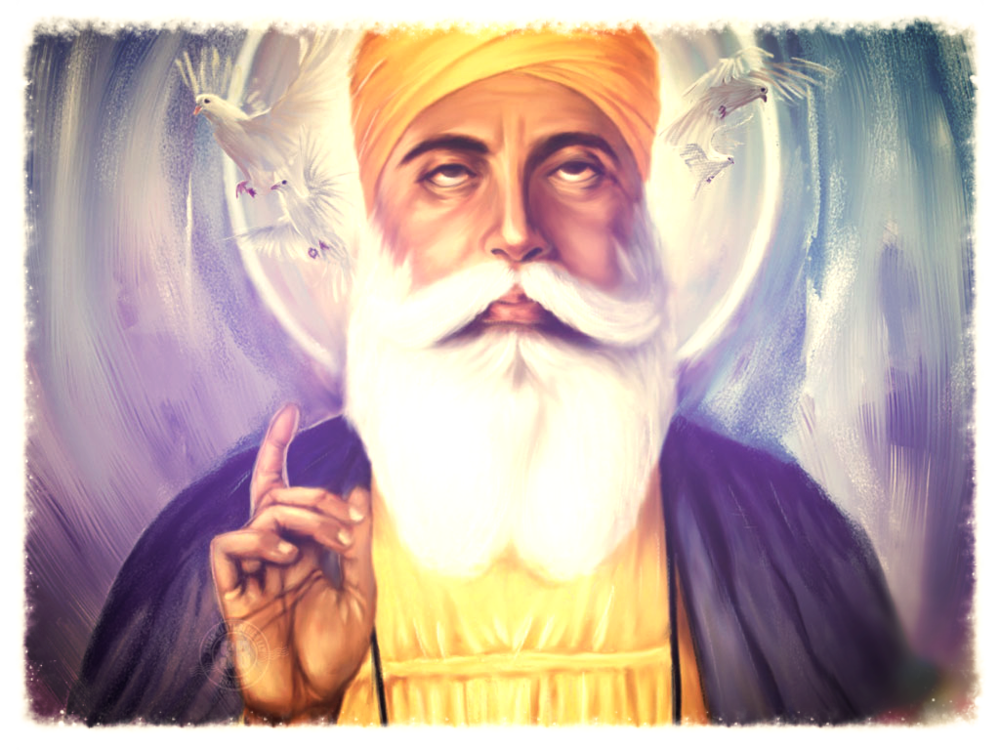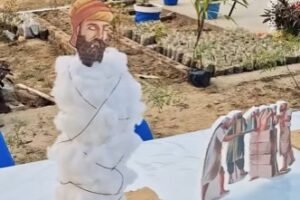Guru Nanak created a creed in which music is the form of worship.
Let’s cast a look at the Guru’s aarti and its composers.
Jo tis bhaavai so aarti ho-ay
(663) (That which pleases Him is true worship.)
Versatile actor Balraj Sahni once asked the Nobel laureate Rabindra Nath Tagore, ‘You’ve written the National Anthem for India. Can you write an Anthem for the whole world?” ‘It’s already been written, not only for the whole world but for the entire universe, in the 16 century by Guru Nanak,” replied Tagore.
The Gurudev was referring to Guru Nanak’s aarti (the ceremony of light). Tagore was so much enamored of this aarti that he, himself, rendered it in Bangla.
Every evening in all the gurdwaras, after the recitation of Rehras Sahib, we hear the melodious rendition of the aarti sung in Paaga Dhanasri. This is a tremendously soothing experience, capable of taking us directly into the spiritual realms of devotion through music.
Guru Arjan says:
Aarti kirtan sadaa anand (393)
(Singing God’s praises is His aarti, bringing boundless bliss.)
As legend has it, in 1508 AD, Guru Nanak visited the renowned temple of Jagannath Puri in Orissa, which was famous for its aarti for Lord Krishna. In the evening, the priests brought a platter-full of many lighted lamps, flowers, incense and pearls and began the aarti. Nanak (meaning the ‘little one’) meanwhile spontaneously gave words to the wonderful aarti, which was being hummed by the Nature before the invisible altar of God, the creator of this universe:
Gagan mein thaal rav chand Deepak bane tarikaa mandal Janak moti Dhoop malyanlo pavan chavro kare Sagal banraye phulant jyoti Kaisi aarti hoye bhav khandanaa Teri aarti (663)
(The sky is the puja thaal, in which the sun and the moon are the diyas/The stars in the constellation are the jewels/The wind laden with sandalwood fragrance, is the celestial fan/All the flowering fields/forests are the radiance! What wonderful worship this is, O Destroyer of fear, This is your prayer.)
The aarti that is sung daily in the gurdwaras is, however, partly composed by Guru Nanak. The second stanza, from:
Naam tero aarti majan muraare Harke Naam bina jhoothey sagal pasaarey (694)
(O Lord, Thy Name to me is the aarti and holy ablutions. Everything else is false)

Versatile actor Balraj Sahni once asked the, Nobel laureate Rabindra Nath Tagore,“You’ve written the National Anthem for India. Can you write an Anthem for the whole world?” “It’s already been written, not only for the whole the world but for the entire universe, in the 16 century by Guru Nanak,” replied Tagore. The Gurudev was referring to Guru Nanak’s aarti.
Onwards, has been composed by Ravidas, who, incidentally was a cobbler. The third stanza, from:
Dhoop deep ghrit saaji aarti vaarne jaaun Kamlaapati (695)
(May I be a sacrifice unto the Lord: that for me is the aarti performed with lamps, ghee and incense)
Onwards, was composed by Sain, a barber in the court of Raja Ram, King of Rewa. The fourth stanza:
Sunn sandheya teri dev devaakar adhpat aad samaayi (1350)
(Brothers! That is how the immaculate Lord’s aarti is made: Let Divine essence be the oil, the Lord’s Name the wick and the enlighted self, the lamp. By lighting this lamp, we invoke the Lord)
Onwards, was composed in the same vein by Kabir, the Muslim julaha (weaver). Thereafter, from
Gopal tera aarta jo jan tumhri bhagat karante tin ke kaaj sanvaarta (695)
(O Gopala, accept your aarti! You grant the wishes of those, who worship you)
Onwards, was composed by Dhanna, a simple Jat farmer from Rajasthan.
Guru Gobind Singh composed the final part of the aarti, from:
Yate prasanna bhaye hain maha mun devan ke tap mein sukh paave jag kare ik baid rarey.
(The Lord is pleased by penance, prayers, rituals, recitations of the scriptures, meditation, music, dance of the celestial beings and the melody of the aarti. The cosmic worlds rejoice and chant the ‘Divine Name’.) Onwards:
Truly speaking, the aarti that we sing daily, depicts the uniqueness of Sikhism. It has been composed by two Gurus, a cobbler, a barber, a weaver and a farmer. It emphasizes the basic belief of Sikhi that the entire world is born of the same eternal light:

Awal Allah noor upaayaa Kudrat ke sab bandey
Ek noor Te sab jag upajayaa Kaun bhale Ko Mande (1349)
(First of all, God created the divine light; Divine Mother Nature created the entire universe and the creatures with the same soul; so how do we differentiate that the one is better than the other?)
Thus, the aarti of Guru Nanak encompasses the essence of Sikhi.







